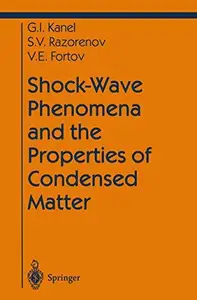
Free Download Shock-Wave Phenomena and the Properties of Condensed Matter By G. I. Kanel, V. E. Fortov, S. V. Razorenov (auth.)
2004 | 322 Pages | ISBN: 1441919163 | PDF | 19 MB
Strong shock waves present unique opportunities for investigations in the fields of physics of condensed matter, thermophysics, physics of strength and plasticity, and chemical physics under conditions of the highest possible rates of deformation, and high pressures and temperatures. The physics of shock waves in condensed matter deal with pressures from ~100 MPa to several hundreds of GPa (and up to ten TPa in some unique experiments), temperatures up to tens of thousands of K, and durations of load application from nanoseconds to a few microseconds. Behavior of a material under these extreme conditions often differs radically from expectations based on quasistatic observations. As an example, observed anomalous temperature dependencies of the strength properties of some metals were not predicted by theories. The investigations of shock-wave phenomena in condensed matter that are discussed in this book are stimulated by the necessity to develop methods for predicting effects of explosions, high-velocity collisions, and other sources of intense dynamic loading of materials and structures. In the modern view, complete predictability is achieved when computers can accurately simulate processes of interest. The simulations require development of thermophysical equations of state and constitutive relationships that describe processes of inelastic deformation and fracture, polymorphic transformations, chemical reactions, melting, vaporization, ionization, and other phenomena observed under these conditions. Systematic discussions of various aspects of thermomechanical behavior of solid materials of different classes when subjected to shock-wave loading comprise the main part of this book. It provides an account of recent Russian work in this field that is unique in its balanced coverage of theoretical, experimental, and computational results. The discussions include a comprehensive analysis of:The structure of compression and rarefaction waves in solids, experimental data on the dynamic yield and tensile strengths of metals and alloys at normal and elevated temperatures, and constitutive relationships that describe high-rate yielding Static and dynamic compressive deformation and fracture of brittle materials, and failure-wave phenomena Shock induced polymorphic transformation, melting, and vaporization Explosive initiation and detonation phenomena, with emphasis on macrokinetics of chemical energy release Physics of the most extreme states of matter accessible by shock compression.
Shock–Wave Phenomena and the Properties of Condensed Matter Torrent Download , Shock–Wave Phenomena and the Properties of Condensed Matter Watch Free Link , Shock–Wave Phenomena and the Properties of Condensed Matter Read Free Online , Shock–Wave Phenomena and the Properties of Condensed Matter Download Online
